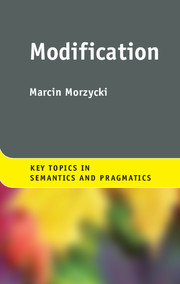5 - Adverbs
Published online by Cambridge University Press: 05 November 2015
Summary
Introduction
If adverbs were sentient, we might pity them. Sometimes, they are treated as nothing more than adjectives crudely tarted up with some minor ornamental morphology. At other times, they are treated as the ‘wastebasket category’, because ‘adverb’ is what you call a word when you've run out of other names to call it. All sorts of stray mystery particles have been described as adverbs, for the most tenuous of reasons or for no particular reason at all. Worse still, the term is often taken to include not just a motley assortment of scarcely related lexical riffraff but also whole phrases without regard to their syntactic category. Loiter around the peripheries of a clause for too long, and you too might be accused of being an adverb.
To be mistreated unjustly is bad. It's worse when it's precisely what you deserve. The prototypical exemplars of adverbs are genuinely very adjective-like, and languages don't always bother to make the distinction. And these expressions really do seem alarmingly and confoundingly promiscuous in their distribution. Even so, whatever their internal properties, the question of how they fit into the semantics of larger expressions is interesting. Equally interesting is what about their semantics accounts for their versatility. Adverbs in this more restricted sense – adjective-like things in non-adjective-like positions – will be the focus of this chapter. For the most part, modifiers of other categories will enter the discussion only to the extent that their semantic contribution resembles that of adverbs proper. More generally, I will observe a distinction between ‘adverb’, the name of a syntactic category, and ‘adverbial’, the collective term for phrases headed by adverbs and for phrasal modifiers of verbal projections and clauses.
Part of the focus on adverbs in the more restricted sense is practical. Discussing adverbials as a class would entail discussing virtually all of formal semantics. There's hardly any area of the field that hasn't been concerned to a large extent with some class of adverbials in one way or another, and in certain areas – such as temporal semantics – the analysis of adverbials constitutes much of the enterprise. Unavoidably, though, I'll briefly touch on some adverbials whose serious examination is best undertaken by looking elsewhere (say, a book on temporal semantics). Many issues that fall under the broad rubric of ‘adverbials’ will also be taken up in Chapter 6 as instances of crosscategorial phenomena.
- Type
- Chapter
- Information
- Modification , pp. 193 - 249Publisher: Cambridge University PressPrint publication year: 2015

